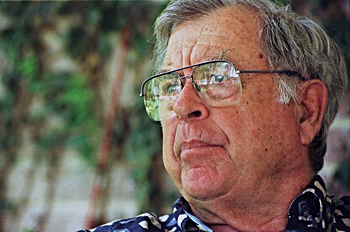Once upon a time in Washington, a former POW remembered, and I listened

By Patrick B. McGuigan | Watchdog.org
OKLAHOMA CITY – Jeremiah Denton spent eight years from 1965 until 1973 as a prisoner of war in North Vietnam, including time in the “Hanoi Hilton.”
LONG MAY HE BE REMEMBERED: Retired Adm. Jeremiah Denton died last week.
Hailed as a hero after his return to the U.S., the U.S. Navy aviator won Alabama’s 1980 U.S. Senate race. He was among the notable winners in the “Reagan landslide.”
As Thanksgiving week 1985 neared, he sat for a taped interview that became an indelible memory in a young reporter’s early career.
With publication intended for December, I asked him to recall prison experiences in or around holidays.
The jailers, he said, would sometimes “give us a good meal at Christmas. The idea was to take photographs of the POWs eating together to show how ‘good’ the treatment was.”
Denton and other prisoners learned how to communicate in Morse code. They used sticks or small rocks to tap or scratch on the wall of their isolated cells. The sound carried through the walls.
Eventually they established hierarchy and rank, keeping each other informed of torture or other mistreatment, sharing memories of home and families.
In “August of 1966 or so,” Denton said, prison camp authorities discovered the communication system. Unable to understand what the men were saying to each other, they brutally retaliated.
For Denton, “It was not routine torture. They were trying to break my will because I had caused them considerable difficulty as leader of the POWs in the camp known as The Zoo.”
The jailers built a mechanism that pressed metal into his tendons, and pressured a bar across his legs.
“I was in what they call hellcats, very sharp handcuffs, with my hands behind my back so that the wrists were together. … I couldn’t feel my legs — I had lost the feeling in them after six hours. But I couldn’t lie back because the pain of the sharp cuffs on my wrist and bone was incredible.”
He could not eat. After five days, he was losing blood and was often unconscious. He feared he would talk, giving information to the enemy.
TORTURE AND TRIUMPH: While held prisoner in North Vietnam, Denton spelled in Morse code the word “torture” — informing American officials of the treatment he and other POWs were receiving.
“(T)he chills would come and the other guys could hear me shake all over the camp as the chains and torture apparatus jangled. It was an awful sound. This would be followed by the fever,” he told me
“One night I had been through all of the prayers that I could think of. … It was at the end of a second set of five days of torture. I said to God: ‘Lord, I have no will, no means left with which to resist. You say, “Ask and you shall receive. ” I have asked; I haven’t received. I am totally helpless. … So I am turning it all over to You. Everything. It is up to You to get me out of this or let me die here. ‘ …
“I was suffering a chill when I made that act of total self-surrender. The instant I finished that prayer — I stopped shaking. I didn’t feel any pain. It was like a blanket, like warm air … something tangible that came over me. … I wasn’t cold any more. I felt zero pain. Zero anxiety. Zero fear.”
Then arrived a guard nicknamed “Happy” — an individual less brutal and inhumane than the other jailers. Just after Denton’s desperate prayer, he came into the cell.
Denton told me he “spoke” to Happy with his eyes, communicating, “You are not hurting me. I don’t feel anything. And you are not at heart a bad man.”
Happy pushed another guard away from Dento, and they left.
For a time, the torture ended.
It was Denton who, in a television interview with a journalist sympathetic to the North, gave innocuous verbal answers while spelling out, with blinks and shifts of his eyes, the words “T-O-R-T-U-R-E,” informing his military colleagues via Morse code of the treatment American prisoners were receiving.
In our talk, Denton remembered his childhood. He recalled stories about not only the first Christmas, but also the Passion, the days before the death of Jesus. His experiences deepened his awareness of the sacrifice of the Cross.
Denton thought “about the pain Christ endured walking through the respective trials he underwent – the religious and then the state trial. … The experience that I had of metal on bone, particularly in the ankle and the foot, made me remember what I was told about that unstated pain. … (Y)ou become conscious of things like that. The pain Christ must have felt. ”
No wonder his autobiography was called “When Hell Was in Session.”
In memory, I see him sitting across from me at his desk, fingers fingers rubbing his forehead.
His eyes were closed as he related experiences few of us can imagine.
After his Senate years, Denton worked for a variety of charities, continuing to speak out about policy, morality and fortitude.
Denton died last Friday.
In this season, it seemed right to share part of his story again.
Contact at pmcguigan@watchdog.org . His past reports on Denton have appeared in Conservative Digest, The Oklahoman and other publications.







